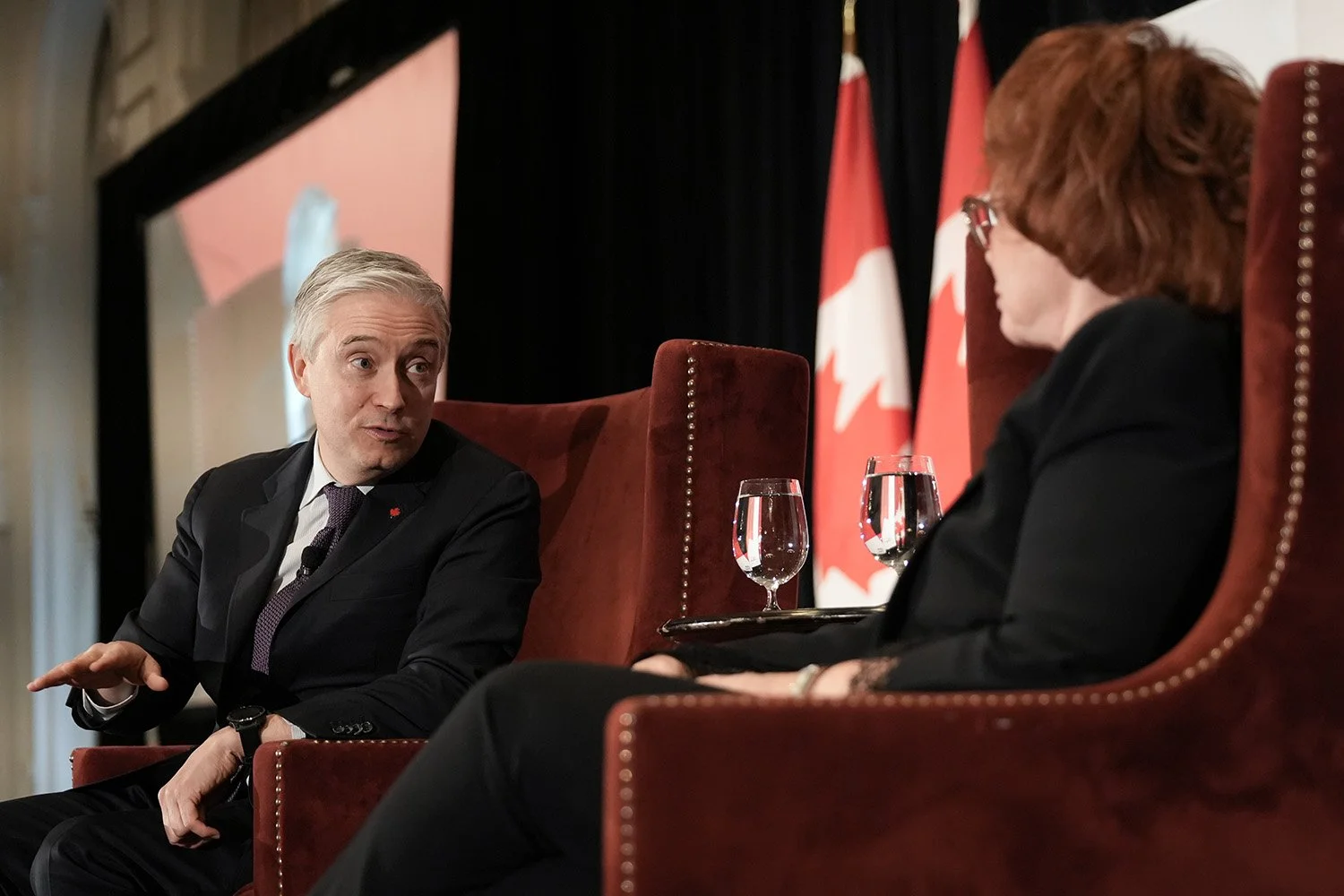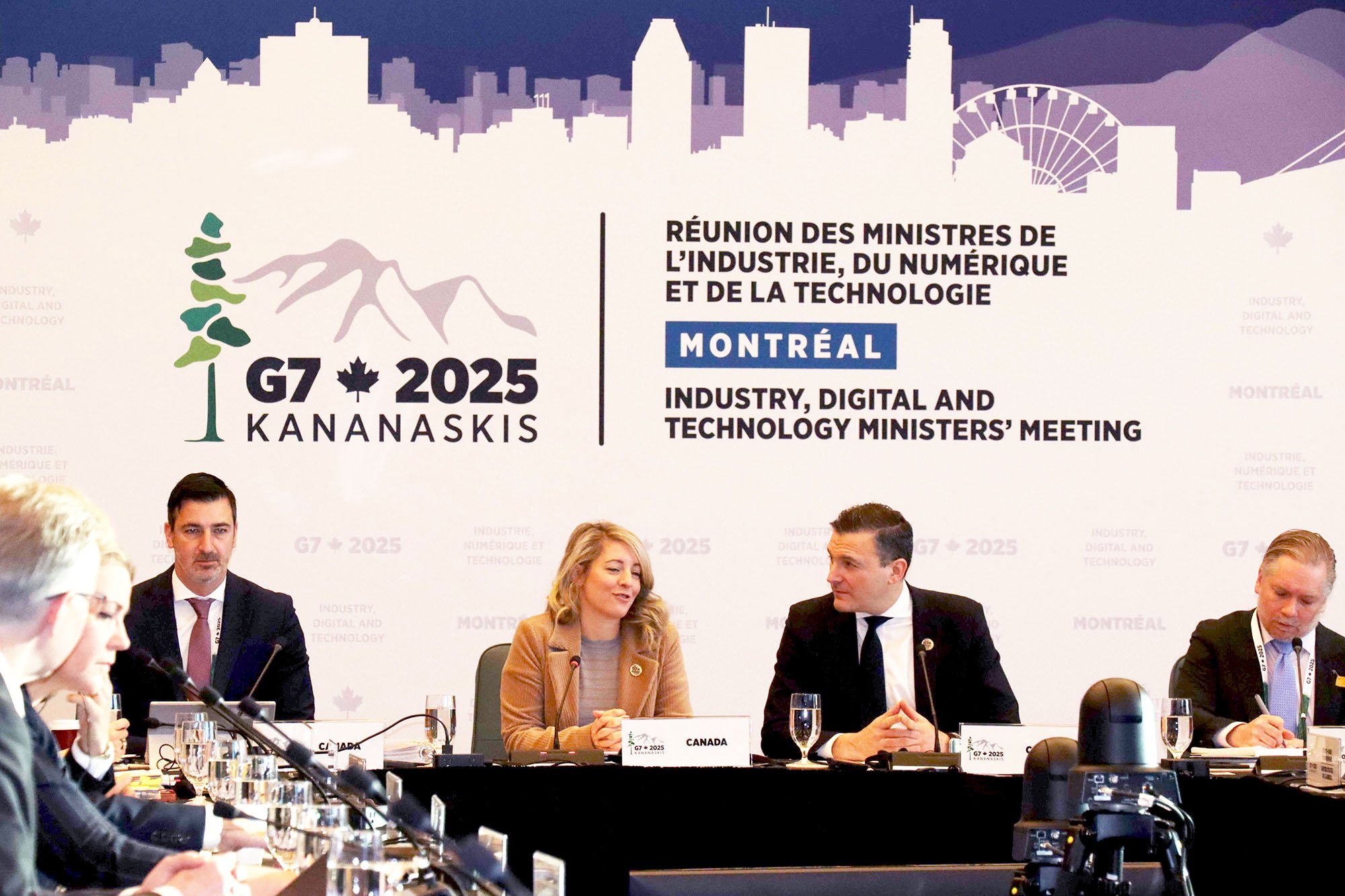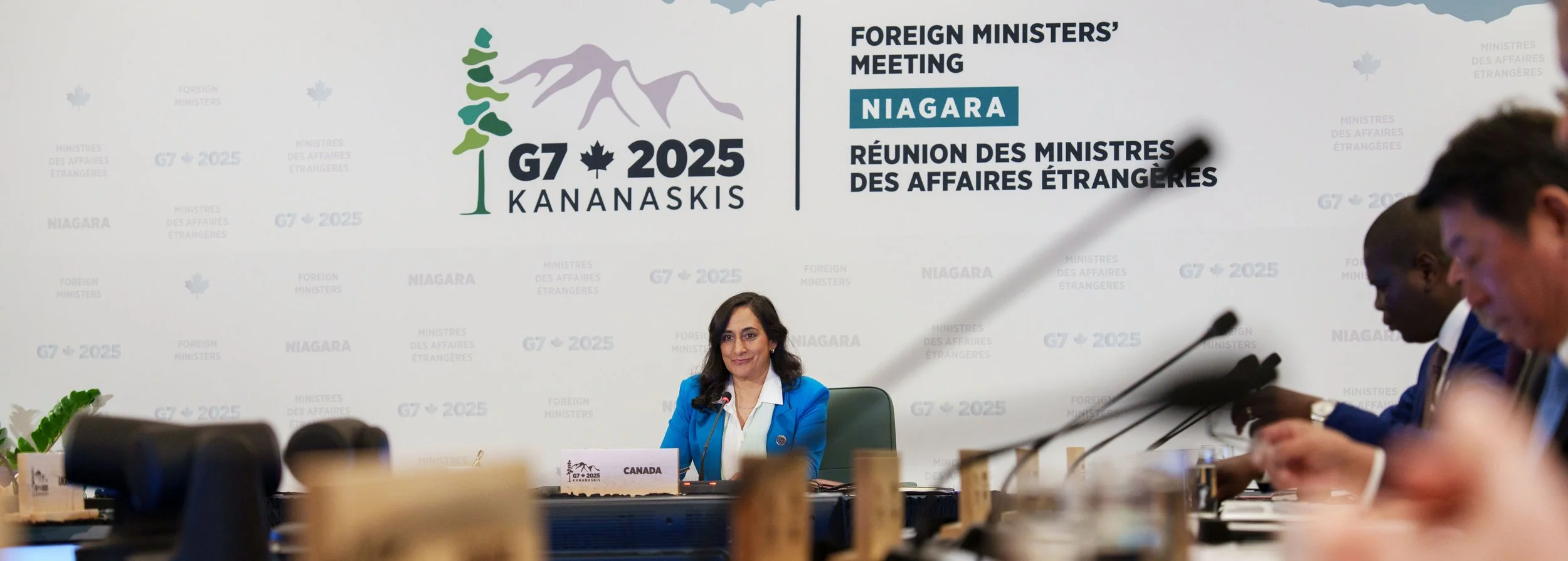Champagne: ‘Nostalgia is not a good strategy’
‘We need to build one Canadian economy. We need to finish the unfinished work of Confederation,’ Finance Minister François-Philippe Champagne told the Canadian Club of Toronto, in conversation with Arlene Dickinson. / CANADIAN CLUB OF TORONTO PHOTO
Canada’s global value is rising as concerns around energy, the economy, food and national security converge, and this new geopolitical reality is reshaping how countries choose long-term partners, says Finance Minister François-Philippe Champagne.
“We live in a world where the nexus between energy security, economic security and national security is becoming closer than ever. I think people get that, and I could even add food security to that, and so that nexus is really putting Canada on a pedestal, I would say, in many ways, because when you put these things together, the world is looking and saying, ‘Who will be my stable, reliable partner, 10, 20, 30 years from now, obviously today, but also for the long term?’ And I think Canada stands out,” he told a business audience at a Canadian Club of Toronto luncheon event on Nov. 13.
Champagne emphasized the 2025 budget as a bid to cement Canada’s role in critical minerals, clean technology and advanced manufacturing, backed by a productivity “super-deduction,” faster permitting and tougher protections for strategic assets.
He said the budget is a “game changer” and will make Canada “the most competitive tax jurisdiction.”
In conversation with Arlene Dickinson, founder and general partner of District Ventures Capital and of Dragon’s Den fame, Champagne framed it as an ambitious moment but one that is also possible.
The following are highlights from the Q&A, edited for length and clarity.
AD: The budget opens with a very strong focus on sovereignty, on defence and Canada's global standing. But how do you reconcile those urgent priorities with the reality that many Canadians are still struggling with high costs and tariffs, and where in the budget, does a household and the everyday Canadian feel some belief?
FPC: If you look at the G7 countries today, affordability is really what mattered most. … The first affordability measure for me is to leave more money in the pocket of people, which we did with the tax cut, then obviously building more homes so people can find a place where they live. If you look at the Uncertainty Index, we are higher today than where we were during the financial crisis, and not by a small delta, by a huge margin. … We cannot let uncertainty become the new certainty. The world is expecting better from us. … We're putting the country on a much more predictable and stable path in order to do that. And I think we found the right balance. … In the face of headwinds in the global economy, we need to make these pillar investments that are going to provide growth and make sure that Canada succeeds for generations to come.
AD: I want to talk about the productivity super deduction that you put in place. So that's a really strong signal for manufacturers to invest but will that process to get that deduction match the urgency of the deduction? I mean, you're asking people to invest, but there's really not a clear line of sight to the approvals and the time. So tell this group how they can anticipate how quickly they're going to be able to get approvals, and what the timeline looks like for that?
FPC: I understand, and you understand that a lot of people have a choice, you know, when they allocate capital, and obviously we need to be competitive. We have a neighbour to the south, and it was important for us to send a strong signal so that $1 invested now in Canada, from a tax perspective, is more competitive than $1 invested in the United States. So that's step one. … Now, if you're going to invest in automation, robotization, or even AI on quantum technology, you can expense that. So that is powerful because making our country more productive and competitive has been the talk in town for many, many, many years. So we're doing our part, and I think it's going to really provide this kind of investment attraction that people want to see in the country. … One other thing is that if you look at the world today, stability, predictability and the rule of law is in high demand, and I would say, sometimes short supply, depending where you are in the world. … And we are the only G7 country with a free trade agreement with all the other G7 nations. So, yes, the world is facing some headwinds. But when you compare Canada to other nations, not only do you have the fiscal capacity, but you have the pillar to sustain that and to build for growth. And that was really the decision to say this needs to be an investment budget so that we make sure we put Canada on the track for growth for generations.
AD: But to that question, I mean, I think there would be quite a few businesses in this room that would be in the service industry or who are in innovative businesses that aren't yet profitable. How do they participate in that productivity push? Because a lot of that entire deduction is meant for larger scale profitable businesses to help them scale even more. What about those service industries and those innovative companies that aren't yet profitable?
FPC: First, we need to build one Canadian economy. We need to finish the unfinished work of Confederation. You know, whether you sell products or services, you should be able to sell across our nation. … The second thing I just mentioned is being our own best customers. When I started in government a few years ago, I remember the mantra was open by default, and I said, What about Canadian by default? You know, what about us being the first customer for entrepreneurs, for our startups? Why not buying Canadian?
AD: Diversification sounds really good on paper, and expanded trade partners are critical. We all know that, but exporters are still facing clogged ports, freight delays, regulatory barriers. What concrete fix is going to land first? And when do you anticipate that that is going to ease for people who want to take advantage of the trade relationships that you're forging across the globe?
FPC: We need to learn from this moment. And I would say nostalgia is not a good strategy. The world is never going to be the same. Every country in the world now needs to pay to access the largest market in the world, and for us, I go back to my example. If you're the only G7 country which has free trade with all of the other G7 you're ahead of the pack. … We want to go from $300 billion to $600 billion of exports overseas. This is ambitious, but it is possible. And I think that's the answer also for small and medium sized businesses to say, how can we work with them? We've increased the facilities also at EDC, which has been a great partner for a number of firms to access these new markets. And so those are the kind of things that are going to be helping in a very concrete way, people to find new customers … There's been kind of a moment now that we need to make sure we put the house in order so that we can succeed in this very different world.
AD: Let's talk about trade barriers, because one economy means that business leaders can actually count on being able to move across this country more easily between provinces and be able to trade more effectively between provinces. So are there any specific barriers that you see being removed in the next year?
FPC: We did our part to remove as many barriers as possible, but I think we need our collective voice to say, Now, let's move to the next phase and really finish the work that has been initiated. And I think that would be significant. We've seen the impact on GDP that this could have, and that's going to be, this is work in progress. Like I said, we did our part, but there's more to be done from our provincial colleagues.
AD: The budget has many good things in it with a lot of ambition. … But the real question after that is, how is government going to be able to execute on this, especially with a reduced workforce. Are you modernizing? What are you doing to ensure that these big changes can actually get executed well inside of the context of modernization of the government today.
FPC: Well, you focus on what really matters. …. It's always about focus, prioritize and execute. The focus that it brings on these projects of national interest, I think, is helping also the nation to pay the attention needed to these projects. … We live in a world where the nexus between energy security, economic security and national security is becoming closer than ever. I think people get that, and I could even add food security to that, and so that nexus is really putting Canada on a pedestal, I would say, in many ways, because when you put these things together, the world is looking and saying, ‘Who will be my stable, reliable partner, 10, 20, 30 years from now, obviously today, but also for the long term?’ And I think Canada stands out.
AD: I think in business, we all understand the nexus between strategy and execution, how important it is to execute well and government, it's about moving from policy to practice and making sure that the practices that government puts in place are actually defending the policy and the intention of it. So there's an audience question for you, how is your government protecting national champions in the critical mineral sector, such as tech, from foreign takeovers?
FPC: Well, I'll tell you very simply. … When you have foreign companies who want to take Canadian companies, there's a national security review in all cases, and there's the net benefit test for transactions of a certain level. … [As Industry Minister] I added economic security as national security, so that if someone would want to take over one of our critical assets in Canada, whether it's about critical minerals or other assets, we could consider it as part of national security, economic security. … When you look at these investments, obviously, we're a very open country. We welcome foreign investment … but at the same time with this nexus of national security and economic security and critical minerals and critical resources, you have to engage with eyes wide open.






